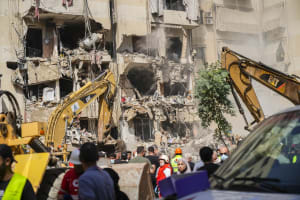Israeli forces at the site where a missile fired from Lebanon hit houses and cars in Kiryat Bialik, northern Israel, September 22, 2024. Photo by Chaim Goldberg/Flash90
At least 130 rocket launches toward Israel were detected on Sunday morning, as Hezbollah retaliated against Israeli strikes over the weekend, which included the elimination of senior elite Radwan Force commanders.
The significant Hezbollah response triggered air raid sirens further south in northern Israel, reaching the Jezreel Valley, including areas where alarms sounded for the first time since the war began.

(Screenshot of Red Alert app showing rocket sirens in northern Haifa during rocket barrage around 6:30 AM)
The heavy barrage of rockets apparently included the use of longer range, Fadi 1 and Fadi 2 rockets fired at the Ramat David Air Base. If true, this would mark the first use of these longer-range, heavier missiles since the start of Hezbollah’s incessant rocket and missile attacks on Israel on Oct. 8.
The Fadi 1 and 2 rockets are larger, heavier rockets than the Katyushas that the group normally fires, with a range of around 80 km (50 miles) for the Fadi 1 and 105 km (65 miles) for the Fadi 2.
The Fadi rockets appear to be variations of the Raad-2/Raad-3 and Kaibar 1 rockets. According to Hezbollah-affiliated Lebanese news channel, Al-Mayadeen, the rockets were launched from an underground launcher known as “Imad 4.”
Hezbollah’s terrorism targets civilians.
Hundreds of thousands of Israeli civilians spent their night hiding in bomb shelters, while barrages of rockets were flying over their heads, some hitting their homes, and rocket alert sirens were constantly sounding throughout the night.… pic.twitter.com/2XzgAQQ7Fp
— Israel Defense Forces (@IDF) September 22, 2024
Last month, Hezbollah released a video showing the Imad 4 launch facilities, underground launchers that can be resupplied via tunnels to avoid exposure to Israeli airstrikes.
Several reports from both Lebanon and Hebrew media claimed that the group also fired Fajr 5 guided missiles. While these missiles have a shorter range and smaller payload, they are highly accurate due to their guidance system.
The IDF announced that approximately 105 launches were detected within an hour and a half, several of which were intercepted. However, impacts were detected in Kiryat Bialik, where three people were injured, as well as in Beit Shearim, Nazareth and near Kfar Baruch.
The injured in Kiryat Bialik include a 70-year-old man in moderate condition, as well as another man in his 70s and a 16-year-old girl who sustained minor injuries. According to Magen David Adom, all three were transported to Rambam Hospital in Haifa.

Emergency personnel work at a site of houses damaged following a rocket attack from Lebanon, in Kiryat Bialik, Israel, Sept. 22, 2024. (Photo: REUTERS/Shir Torem)
Hezbollah issued an official announcement following the rocket fire towards Haifa and the Krayot early on Sunday morning, which involved heavier, longer-range rockets. The terror group said the attack was directed at the Ramat David Air Base in response to the pager and walkie-talkie explosions last week, in which dozens of Hezbollah operatives were killed and thousands wounded.
In the statement, Hezbollah called it “an initial response”, indicating that the terror group could carry out further attacks.
“The shooting this morning into the Haifa area is our initial response to the explosions of beepers and radios in Lebanon,” Hezbollah said in the statement.

IDF Home Front Command Maj. Gen Rafi Milo visits site of rocket attack in Kiryat Bialik, north of Haifa, Sept. 22, 2024 (Photo: IDF)
A 17-year-old youth was killed and four others injured in a car accident near Zarzir, which authorities said happened while they tried to flee the area of a rocket impact. In addition, one missile struck a cowshed in Beit Shearim, killing and injuring several cows.
The association of cities around the Sea of Galilee (the Kinneret in Hebrew), announced the closure of all beaches, while the Ministry of Education, in consultation with IDF Home Front Command, announced that all schools from Haifa to the north would only meet via online lessons.
“This morning after the Home Front Command’s tightening of the defense policy: from Haifa to the north, classes today will be held in a distance learning model only. Haifa and northward, without physical learning. The rest of the country is studying as usual.”
Hospitals in northern Israel also announced a reduction in activity and services due to the increasing Hezbollah rocket fire and its expanded range.
Following heavy fire from Hezbollah, the IDF began striking Hezbollah targets in southern Lebanon. In a statement, the IDF claimed to have hit 290 Hezbollah targets in retaliation for the missile barrages.

































